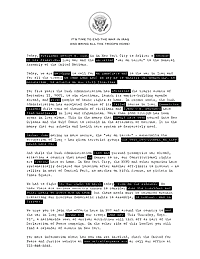tecznotes
Michal Migurski's notebook, listening post, and soapbox. Subscribe to ![]() this blog.
Check out the rest of my site as well.
this blog.
Check out the rest of my site as well.
Sep 26, 2006 6:55am
ec2
I had my EC2 account activated today, and immediately ran off to follow the instructions to see how it works.
Apart from Amazon's baffling array of ID's, secret keys, user keys, certs, and other identifiers that need to be kept track of every few steps, EC2 is a winner. It does exactly what it promises, running virtual machine instances that can be instantiated and destroyed at will. The first one takes a few minutes to boot, and the process of making a machine snapshot is slightly laborious, but once the initial hurdles are clear, saved machine states start up almost instantaneously and are immediately available for use.
Combined with S3 for storage, this is a total winner. It's fortunate I just happen to be working on something that could benefit from 20 or so dedicated servers chugging away...
My costs so far: $0.31.
Sep 21, 2006 6:19am
price design
I've barely mentione iPods once in a few years of writing here, but this struck me as interesting. John Gruber has an article on Apple's pricing strategy in which he says:
The two Gartner researchers even lamented Apple's decision to discontinue the 1 GB nano, which they say could have been a nice mass-market item for around $99. Why not sell a 512 MB version, too? And what about 3 GB and 6 GB? And what about more colors?
...and:
...a 33 percent price reduction is not a small cut, and it would throw off their nice, even 2/4/8 GB for $150/200/250 pricing scheme.
I'm impressed that Apple designs their prices with the same attention to detail they use to design the rest of their stuff. I feel naturally more comfortable thinking about a price scale that looks as clean as "150/200/250" instead of one that requires a universe of useless choices. Apparently I'm not a rational economic actor.
Sep 20, 2006 4:22pm
redacted
From John:
The organizers asked me to design a flyer to hand out at the march. I took it as an opportunity to do something a little different from a typical flyer. ... The text is styled in the form of a redacted government document. It creates a parallel text that plays on themes of secrecy, coverup, and suppression of dissent, as well as seeing through the lies and reading what is erased.
Sep 19, 2006 3:11am
moo
I've been interested in calling cards for some reason, finding a bunch of cool material about them around the web: visiting cards etiquette, Crane's calling cards, and the famous scene from American Psycho.
Yesterday, Tom showed me a bunch of his new custom-printed cards from moo.com. Today they opened up their site with an offer of ten free, individualized cards based on your Flickr stream for all Pro account holders.
Who's an idiot for deleting his pro account now?
Sep 13, 2006 5:35am
idea2006: I speak!
Next month, I'm going to be speaking in Seattle, at the IA Institute's IDEA2006. There have already been a few posts on the conference blog regarding my topic, and there are a bunch of other great speakers there, including Jake Barton, Alison Sant, Bruce Sterling, and Fernanda Viegas.
This weekend, the registration fee goes up.
Sep 12, 2006 6:13am
locoroco and subversion
I hit the tipping point with two pieces of technology today.
The first is subversion, a revision control package for software developers. I actually first heard about SVN approximately six years ago, at the same time I heard about CVS, my favorite until now. SVN was half-baked at the time, and I became an expert in CVS instead. I tried SVN a number of times over the years, but there was always something wrong enough with it (reliance on db, crappy merge support) to turn me off. This time, it's going to stick. The difference is that I'm experimenting with a project management tool called Trac, which is pretty much requires the use of SVN. The benefit is major enough that I'm finally convinced to switch entirely.
The second is LocoRoco, a playstation game smuggled into our office by Matt, who let me play a level.
The physics and graphics are amazing, and I love that the designers chose to ignore the normally-baffling profusion of buttons on the controller in favor of just three, and focused instead on getting the interaction flow just right. My favorite aspect of the game is the malleability of the character, who can be split or merged into a variable number of smiling orange blobs. The big one can jump higher, the small ones can slip through crevices, and together they form the basis of simple strategy. Very cool.
Sep 5, 2006 4:47am
aubrey/maturin
I never mentioned it, but I finished Patrick O'Brian's Aubrey-Maturin series earlier this year. It's a collection of 20 historical novels set in the British Royal Navy during the Napoleonic Wars (early 19th century). Gem turned me on to the series after we saw Master and Commander, and the books are absolutely brilliant.
The most interesting thing about the books as a whole is the arc of the plot(s). Very few of the books begin and end a single story. Instead, there tend to be three scales of plot: the mission that gives each book its title typically provides only a loose framework for microplot elements (battles, shipwrecks, etc.) of which there are dozens per volume. The macroplot moves from book to book, and concerns friendships, legal troubles, courtships, and marriages. Taken as a whole, the series is one long story spanning as many as two decades.
They're very much worth reading, if you take the necessary six-to-eight months to do so. It also helps to have the right dictionary.






















